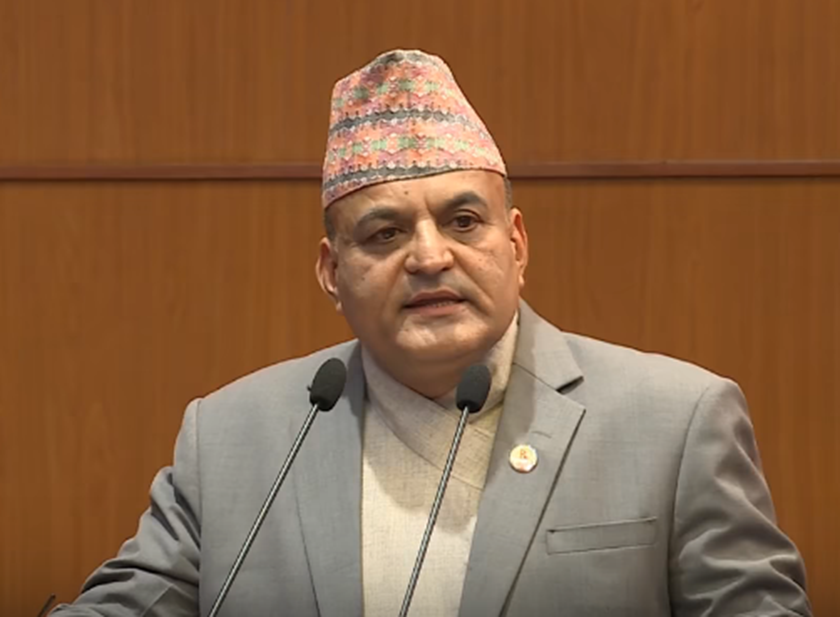Kathmandu. Global markets were jittery on Monday as US President Donald Trump stood firm on his tough tariffs despite growing Chinese retaliation and warnings of a global recession.
Countries around the world are struggling to mitigate the impact of new US tariffs, but Beijing has signaled it is retaliating with tariffs, escalating a trade war between the world’s two largest economies.
Trump doubled down on his demand to cut America’s deficit with trading partners and said he would not cut any deals until that was resolved. “Sometimes you have to take medicine to fix something,” Trump said on Sunday. He told reporters aboard Air Force One that world leaders were “eager to make a deal.” Trump last week announced a basic 10 percent import tariff on goods coming to the United States and higher rates for several countries, including the European Union (EU), Japan and Taiwan.
Most countries have stopped short of retaliating, but China announced on Friday that it would impose a 34 percent retaliatory tariff on all U.S. goods starting April 10, as Asian markets closed.
“(This is) hard-force economic warfare,” said Stephen Innes of SPI Asset Management. “The market is telling you in simple terms: global demand is disappearing and a global recession is coming and accelerating.” Trillions of dollars in stocks have been wiped out globally and Asian equities suffered further losses on Monday as investors fled to safe havens. Japan’s Nikkei fell 6.5 percent, having fallen nearly 8 percent in early trading. Hong Kong’s Hang Seng fell nearly 10 percent and the Shanghai Composite fell more than 4 percent. Taiwan’s main index, which closed down like Hong Kong and Shanghai on Friday, fell nearly 10 percent and Singapore’s fell 8.5 percent.
Futures contracts for the main boards of the New York Stock Exchange fell sharply on Sunday, suggesting more pain for Wall Street stocks when markets open on Monday. US oil prices have fallen below $60 a barrel for the first time since April 2021 on fears of a global recession.
Despite being one of Washington’s closest allies, Israeli Prime Minister Benjamin Netanyahu on Monday became the first world leader to meet with Trump since last week’s announcement. Israel has been slapped with a 17 percent tariff. British Prime Minister Keir Starmer warned in a newspaper op-ed that the status quo would increasingly rely on “deals and alliances” and that “the world as we know it is gone.”
Trump’s gradual deadlines have given some countries room to negotiate. However, he has said he will remain firm and his administration is warning against any retaliation.
“More than 50 countries have contacted the president to start talks,” Kevin Hassett, the head of the White House National Economic Council, told ABC’s This Week on Sunday, citing the U.S. Trade Representative.
Manufacturing powerhouse Vietnam, which counted the U.S. as its largest export market in the first quarter, has already contacted him and requested at least a 45-day delay in reducing the 46 percent tariff imposed by Trump.
Treasury Secretary Scott Besant also told NBC’s “Meet the Press” that 50 countries have contacted him. “I think it’s President Trump’s decision,” Besant said when asked if Trump would negotiate with them. “At this point, he has created maximum influence for himself… I think we have to see what countries offer and whether it is credible.”
“There have been bad actors for a long time and this is not something that can be negotiated away in days or weeks,” he claimed. Trump’s tariff guru Peter Navarro has countered growing concerns, promising investors “the biggest boom in the stock market we’ve ever seen” and insisting “you can’t lose money if you don’t sell.”
Russia was not targeted by the latest batch of tariffs, and Hassett cited talks with Moscow over Russia’s invasion of Ukraine as a reason for their exemption from the hit list. On Wednesday, a White House official suggested that Russia was being left out because trade was negligible due to sanctions. Trump has long insisted that countries around the world that sell products to the United States are actually cheating Americans. He sees tariffs as a way to right that wrong. “Someday people will understand that tariffs, for the United States, are a very beautiful thing!” Trump wrote on Truth Social on Sunday. But many economists have warned that the tariffs will be passed on to consumers and they could see price increases at home.
“I don’t think you’ll see a big impact on consumers in the US,” Hassett said.






























प्रतिक्रिया दिनुहोस्